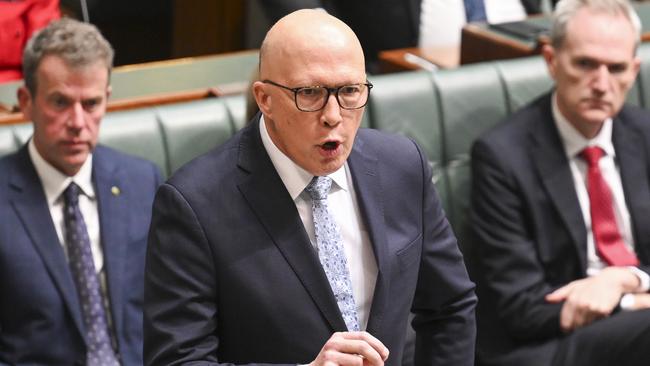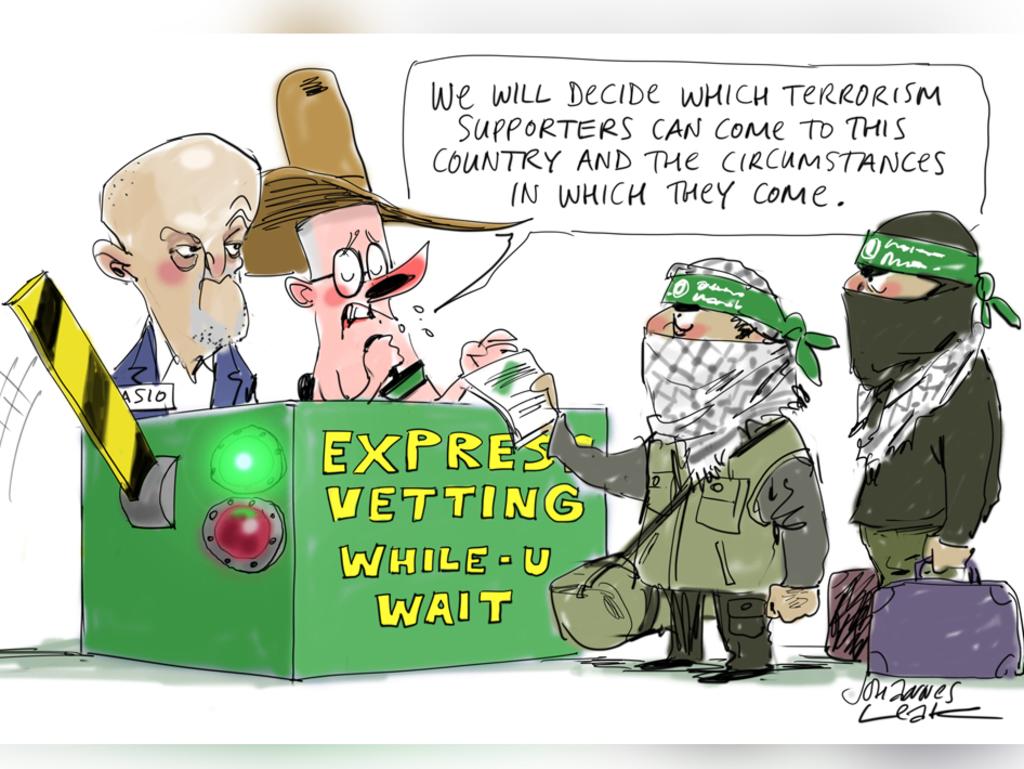Peter Dutton’s Gaza call won’t hurt marginal seats
There are far more marginal electorates with voters who have both parents born in Australia compared to those with above average Muslim populations.

Marginal electorates with large numbers of voters whose parents were both born in Australia and few Muslims easily outnumber battleground seats with large Islamic communities, prompting strategists to declare there will be little electoral downside from Peter Dutton’s hardline stance on Gaza visas.
Analysis by The Weekend Australian highlights the political and demographic drivers behind the Opposition Leader’s call for a temporary ban on visas for people in the war zone, which prompted condemnation from Labor, the Greens, teal MPs and Muslim groups.
Data from the 2021 census, applied to current electoral boundaries, reveals there are 24 marginal seats where the percentage of people whose parents were both born in Australia is above the national figure and the percentage of Muslims living in the electorate is below the corresponding number. In contrast, there are only six marginal seats where there are a lower percentage of people with both parents born in Australia and a higher percentage of Muslims than the nation as a whole. Of those six, the Coalition is a contender in five, one of which is Banks, the southern Sydney seat of Liberal MP David Coleman. He told The Australian he supported Mr Dutton’s call to temporarily ban entrants from Gaza, despite nearly 7 per cent of voters in his seat being Muslim.
“A crucial part of maintaining a strong humanitarian visa program is ensuring that it has robust processes in place to assess applicants,” Mr Coleman said. “It’s clear from the government’s own statements that this is not the case at present. It’s appropriate to temporarily delay the processing of applications until stronger security measures are in place.”
A senior Liberal said party hardheads believed 80 per cent of the community would back Mr Dutton on the issue.
Kos Samaras, director of political strategy and polling group RedBridge, said there were “a lot of marginal seats that are very monocultural”. He said the main political downside for Mr Dutton’s position was the Liberals’ aim of winning back teal seats, as it would not be well received by social progressives.
“It is very politically safe ground for him. What he is doing is he is sending a national security narrative into (marginal) electorates,” Mr Samaras said.
“People won’t necessarily view it through a race lens but a national security lens.”
On Friday, Mr Dutton said Australia was the only country in the world that had allowed Gazans into Australia on a tourist visa since October 7.
“They’ve said that they’re going to allow people who have sympathy to a terrorist organisation, a listed terrorist organisation, to come into our country,” he said. “They’ve allowed 1300 people into our country on a tourist visa. No other country in the world has done that. Not even countries in the Middle East, adjoining countries – Jordan, Egypt – not the United States, not the United Kingdom, not France. Nobody has done this.”
Cabinet minister Bill Shorten said the government had rejected more than 7000 visa applications from Gazans, showing there was a thorough screening process.
“If you genuinely believe that one of these 1300 people is a bad person, don’t sit on the evidence, bring it forward,” Mr Shorten said to Mr Dutton.
The 24 marginal seats with low Muslim populations, and high numbers with both parents born in Australia, include those held by Labor that will be targeted by the Coalition at the election: Lyons in Tasmania; Robertson, Hunter and Paterson, on the NSW central coast and in the Hunter Region; Gilmore on the NSW south coast; Blair, west of Brisbane; and Boothby in Adelaide’s east.
Also in this group are marginal seats the Coalition will be desperate to defend: Bass in Tasmania, Dickson and Longman, north of Brisbane; Leichhardt in Far North Queensland, Casey in Melbourne’s east; as well as Wannon and Nicholls in Victoria and Cowper on the NSW north coast, where independent candidates brought down the margins in traditional Liberal and Nationals strongholds at the 2022 election.
The 15 seats with the largest Muslim communities are all held by Labor and mostly on safe margins. Labor is potentially vulnerable to community-based independent MPs such as Vietnam-born Dai Le, who narrowly won the Labor stronghold of Fowler in southwestern Sydney in 2022.
New political group The Muslim Vote has vowed to run candidates in electorates with large Muslim communities, including those of cabinet ministers Jason Clare (Blaxland, 35 per cent Muslims) and Tony Burke (Watson, 27 per cent Muslims).
In the UK election last month, four independents supported by The Muslim Vote won seats from Labour MPs.
Former Labor strategist Bruce Hawker said the politics of the Gaza issue was more complicated for Prime Minister Anthony Albanese than for Mr Dutton, given the significant Muslim populations in some ALP-held seats.
Mr Dutton’s stance is likely to spark a negative response among progressive voters in inner-city seats that have turned to or been targeted by teal independents and Greens MPs. However, some of these seats also are home to Australia’s largest Jewish communities, including Wentworth and Bradfield in Sydney and Goldstein in Melbourne, where a ban on Gazans could resonate.





To join the conversation, please log in. Don't have an account? Register
Join the conversation, you are commenting as Logout